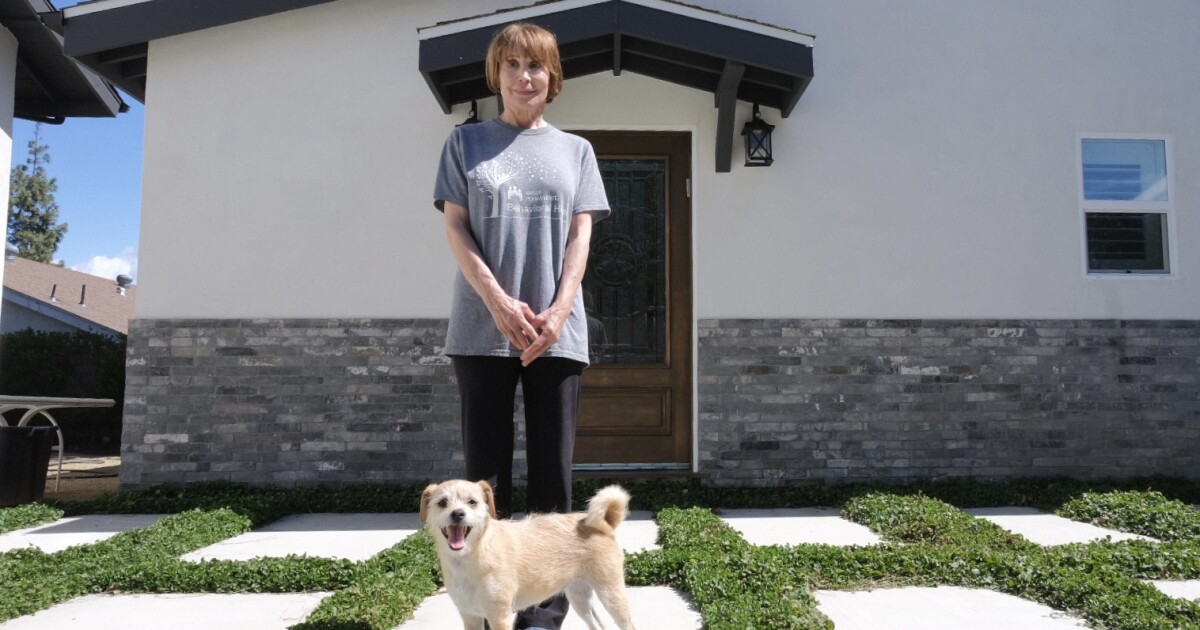Your starter guide to housing development in L.A.
Sign up for Building Your Block, a seven-issue newsletter course from LAist. We’ll explain L.A.’s housing challenges and what you can do to make things better.
Los Angeles City Council members introduced a batch of proposals this week aimed at speeding up the creation of more housing, including new options for achieving what for most Angelenos is an increasingly impossible dream: buying a home.
Among the five proposals put forward Tuesday, two focus on accessory dwelling units — or ADUs. Many homeowners have been building these structures in their backyards to create homes for relatives or to rent out for extra income.
One proposal seeks to allow homeowners to put ADUs up for sale, separately from their main home, potentially creating a cheaper pathway to homeownership for the vast majority of Angelenos who cannot afford to buy larger single-family homes.
In an interview with LAist, Councilmember Nithya Raman, who is chair of the Housing and Homelessness Committee, said these smaller homes could be ideal for L.A.’s shrinking average household size.
“There are many more households where it’s just one person or two people without children,” Raman said. “If that’s the case, then how do we reorganize our housing market and our rules to ensure that we’re producing what’s going to address their needs? … I do think ADUs can be a really powerful tool for that.”
Other proposals from Raman and Planning and Land Use Management Committee Chair Bob Blumenfield focus on streamlining the permitting process and expediting utilities hookups for new buildings.
ADUs are a large chunk of city’s new housing
According to the L.A. Planning Department, ADUs represented 41% of the new housing permits issued by the city last year.
Azeen Khanmalek, executive director of the housing production advocacy group Abundant Housing L.A., said allowing ADUs to be bought and sold is one of the proposals his organization is most excited about. It could boost the number of entry-level homes for younger buyers, he said, and it could benefit older homeowners.
“If you are an aging household and you’d rather stay in place, you can perhaps build an ADU and sell it, stabilize your own finances, keep that property in the family and pass it on to your kids or your grandkids,” Khanmalek said.
A 2023 state law established a legal pathway for buying and selling ADUs, but cities must pass a local ordinance in order to adopt the changes locally. So far, San Jose has chosen to allow ADU purchases, and the Berkeley City Council is considering following suit.
Removing punishments for ‘saying yes to housing’
Another proposal Raman introduced this week would fast-track projects taking advantage of incentives in the city’s recent housing plan update. Those projects would receive department approvals without having to go through a City Council vote.
Priced out of LA homeownership? City Council proposal could allow sale of cheaper ADUs
In the past, council members could effectively kill new housing in their districts because other council members tend to follow the local representative’s’ lead in voting projects down. Raman said she and other council members now want to change that culture in City Hall.
“Political officials are punished for saying yes to housing,” she said. “There’s no reward right now for building desperately needed housing, the way that the system is structured. I think we need to change that structure in order for us to really address our current housing crisis.”
In recent years, the city of L.A. has fallen far short of its state-issued goals for new housing. Last year, the city permitted about 30% of the new housing needed annually to stay on track to meeting the goal of nearly a half million new homes by 2029.
Those shortfalls are happening at a time when the majority of L.A. tenants — who make up nearly two-thirds of the city’s households — are paying rents considered unaffordable under federal government standards.
Blame for the city’s lackluster housing production has been attributed to many factors. High interest rates make the math of financing projects fall apart. The city’s “mansion tax” discourages new apartment projects, according to some economic studies.
For some critics of L.A.’s housing, there’s no one policy to blame. Instead, they argue, city bureaucracy stalls and delays and kills housing by a thousand cuts.
Other efforts to speed up new housing
Raman said she’s hearing the message that the city’s approach to housing needs to change. She said that has motivated other recent proposals, such as allowing more apartment buildings to be constructed around a single staircase, and eliminating parking requirements in new projects city-wide.
“What I hear across the board from people’s interactions with the city is that this is the city that says no,” she said. “To me, this is a set of motions that is a first step towards changing that culture to one that says yes.”
With the City Council now in its July recess, none of the proposals have been scheduled for a vote yet. They’re still in early stages, but they’re coming forward at a time when state lawmakers have also taken aim at barriers to housing development.
Earlier this week, the California Legislature passed a bill that would exempt most urban housing developments from review under the state’s landmark environmental law, which critics say has been used by housing opponents to kill projects that would not harm the environment.
